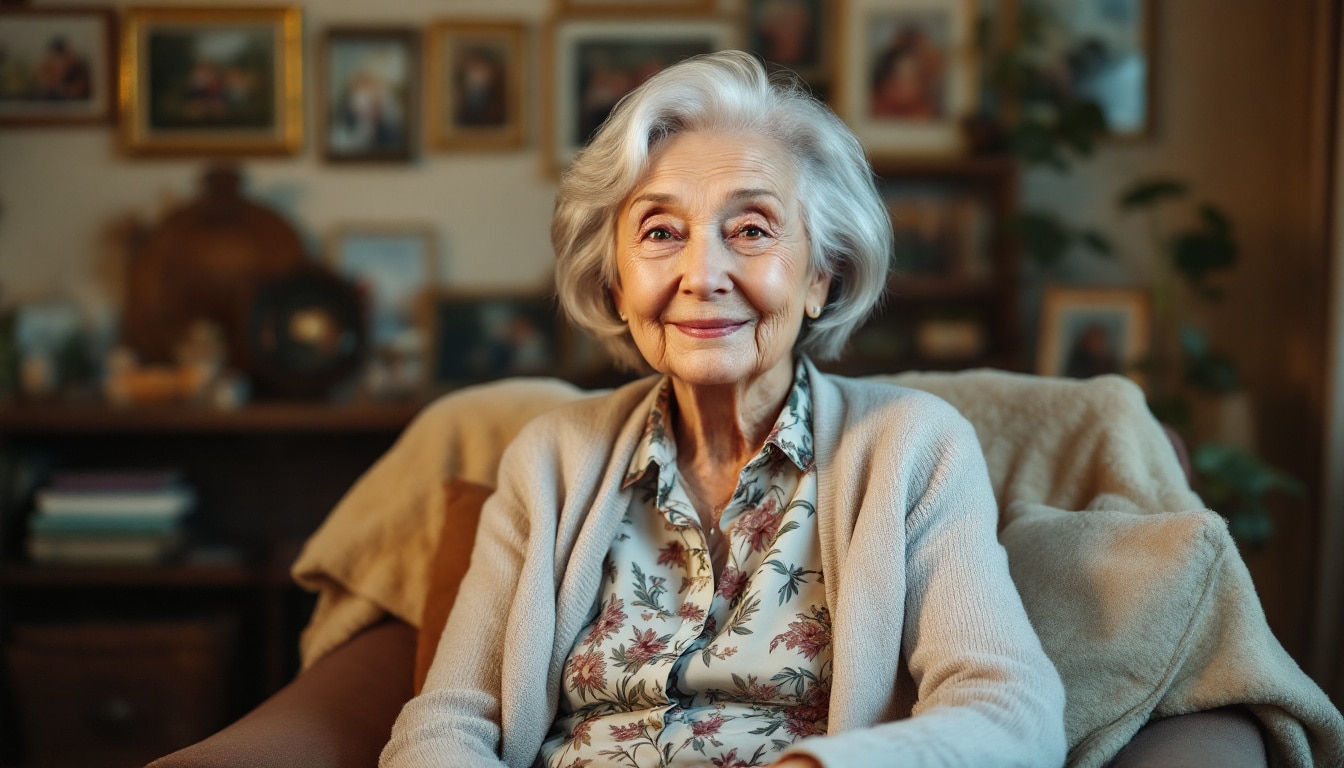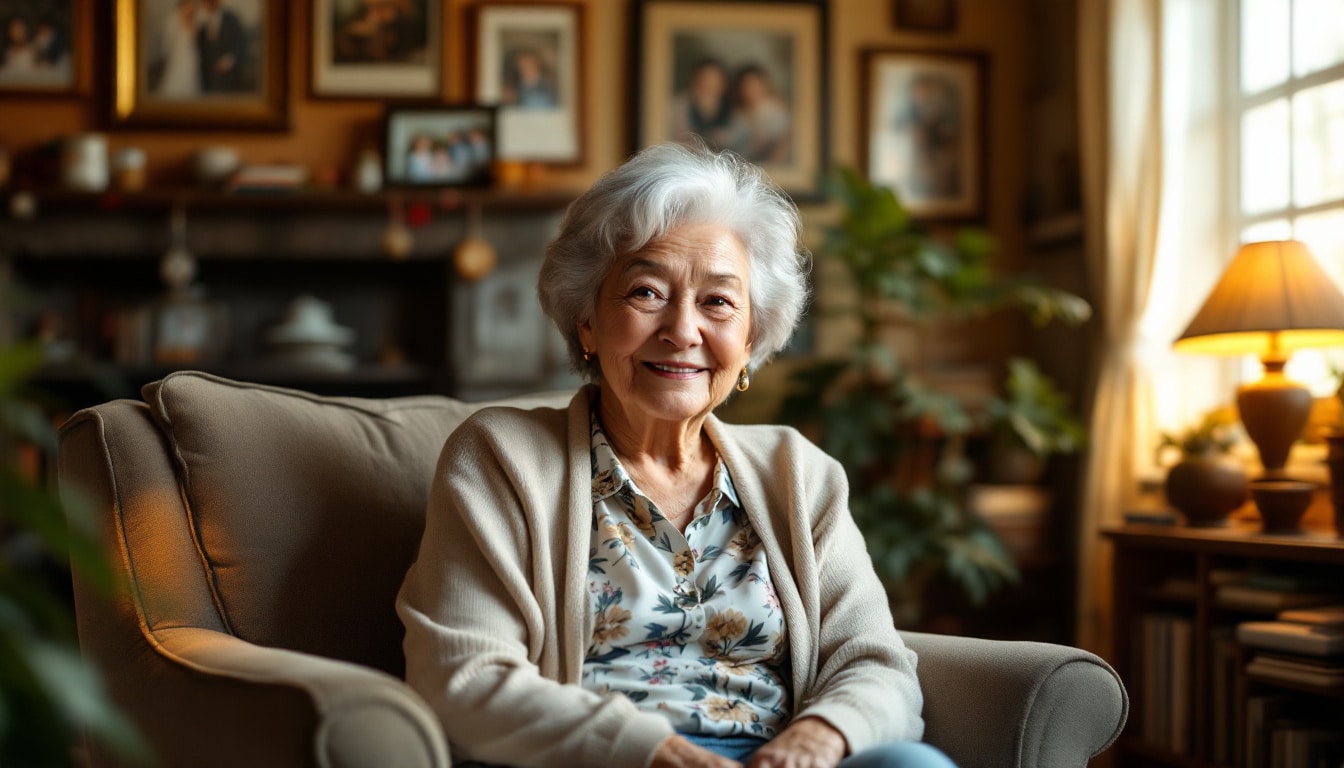Discover the inspiring story of Joanna Choi Kalbus,
a remarkable author who published her first book at 84 years old,
capturing the courage and resilience of her family.
In “The Boat Not Taken”, Joanna recounts the poignant journey of her escape from North Korea with her mother, an odyssey that leads them to the United States. On the occasion of Asian American Native Hawaiian and Pacific Islander (AANHPI) Heritage Month, Senior Planet had the opportunity to talk with her about her writing journey and how this process helped her cope with the loss of her mother.
Joanna’s work presents the poignant tale of a mother and daughter, both originally from North Korea, who must flee a war-torn landscape to build a new life thousands of miles away from their homeland. During our interview, Joanna shared how she initially had no intention of writing a memoir, but that the grief of her mother pushed her to record their story, using a simple journaling process to fill the void left by her loss.
By publishing her first book at 84, Joanna offers valuable advice to aspiring writers: age is not a barrier. She emphasizes the importance of acquiring writing skills through educational courses, writing groups, and workshops, insisting that writing is a community effort, as evidenced by her acknowledgments page.
One of Joanna’s most cherished memories with her mother is their first home in America, a horse stable without a bathroom. Every Saturday, they would go together to a nearby old folks’ home for a weekly bath, an experience that symbolized for them a moment of deep connection and comfort, akin to a day at a modern spa. These precious moments often ended with them singing Korean folk songs under the full moon, reinforcing their unbreakable bond.
Through her book, Joanna hopes that readers will grasp the importance of empathy and understand how global events profoundly influence the individual journeys of families. She invites her readers to reflect on how her narrative has touched and transformed them, highlighting that each memoir, while unique, resonates with universal themes.
Senior Planet is also hosting a Conference with Author Joanna Choi Kalbus on Tuesday, May 27 at 4:00 PM ET, offering a unique opportunity to dive into her literary world and engage directly with her about her incredible writing journey.

Welcome to my site! Today, we dive into the poignant world of memoirs by Joanna Choi Kalbus, a remarkable author who published her first book at the age of 84. Her work, The Boat Not Taken, tells the incredible journey she undertook with her mother to escape North Korea and settle in the United States. This article explores the various facets of this inspiring story, offering a detailed insight into the life and writing of Joanna Choi Kalbus.
Table des matières
Togglewhat inspired joanna choi kalbus to write her memoirs?
At 84, Joanna Choi Kalbus had never considered becoming an author. In fact, she was even unaware of the memoir genre before starting her book. The loss of her mother on January 17, 1996, played a crucial role in this decision. Her mother was her “life historian,” and after her passing, Joanna felt adrift. To fill this void, she began journaling, hoping to maintain a connection with her late mother.
Over time, the many unanswered questions about her mother’s life prompted Joanna to undertake the writing of her memoirs. Armed only with a timeline of significant dates, she started narrating their shared story, transforming grief into a quest for meaning and memory. This process was not only therapeutic for her, but also birthed a deeply moving and authentic work.
Writing these memoirs was a cathartic process, allowing Joanna to navigate through her own emotions and share a universal story of survival, love, and resilience. Her book is much more than just an escape narrative; it is a testament to human strength in the face of adversity.
what is the story behind the book “the boat not taken”?
The Boat Not Taken is the heartfelt testimony of Joanna Choi Kalbus and her mother, both from North Korea. The book recounts their bold escape, their journey through a war-torn landscape, and their quest for a new home in the United States, thousands of miles away from their homeland. This personal odyssey reflects the struggles and sacrifices many families have had to endure to find peace and stability.
Joanna and her mother had to face numerous challenges, from political obstacles to rebuilding their lives in a foreign country. Their journey is punctuated by moments of despair but also of hope and determination. Each stage of their trip is narrated with such authenticity that readers can feel the emotions and tensions experienced by these two courageous women.
The book does not merely describe historical events; it also delves deeply into the mother-daughter relationship, exploring the complex dynamics and unwavering support that helped them overcome hardships. This intimate narration is what sets The Boat Not Taken apart from other escape and survival stories, offering a unique and personal perspective on global events.
For those who wish to learn more about similar stories of resilience and transformation, chinese elders share extraordinary stories is an interesting complementary resource.
how did writing help joanna kalbus cope with grief?
Writing has been an essential tool for Joanna Choi Kalbus in her grieving process. After her mother’s death, she felt lost and disconnected from her identity. The memoirs became a way for her to reconnect with the memories and lessons imparted by her mother, serving as a bridge between the past and the present.
By recording their story, Joanna was able to make sense of the traumatic events they experienced. The act of narrating their journey allowed her to transform pain into a personal and meaningful narrative. This process not only helped Joanna cope with her loss but also created a lasting legacy, preserving her mother’s experiences and sacrifices for future generations.
The writing process also offered Joanna a space to reflect and understand the complexities of their migration, integration, and the challenges they had to overcome. This introspection deepened her empathy and understanding of family dynamics, thus enriching the depth of her memoirs.
As Joanna highlighted in an interview with Senior Planet, “[…] my main takeaway in writing this book is that the most precious word in our lexicon is empathy.” This realization underscores the importance of understanding and sharing the experiences of others, a lesson that Joanna wishes to convey through her work.
what advice does joanna kalbus offer to beginning writers?
Joanna Choi Kalbus’s journey as a beginning writer at 84 is an inspiration for many aspiring authors. Her first book, launched on May 6, 2025, demonstrates that age is just a number when it comes to pursuing creative dreams. According to Joanna, what matters is the wisdom and experiences accumulated over the years, assets that enrich the writing process.
She encourages future writers to embrace their unique journey and not be discouraged by a lack of formal training at the outset. Joanna herself began writing without mastering the craft, but gradually acquired the necessary skills by enrolling in adult education courses, joining writing groups, and attending workshops.
A key aspect of her advice is recognizing the importance of collective effort. “You write alone, but ultimately, it takes a village,” Joanna states, referring to all the people who supported her project, as evidenced by the acknowledgments page of her book. This support network is vital for overcoming challenges and achieving goals as a writer.
For those who wish to learn more about the challenges and successes of iconic figures across different industries, open thread: whatever happened to iconic figures? offers an interesting perspective.
what is joanna kalbus’s favorite memory with her mother?
Among Joanna Choi Kalbus’s many cherished memories, one iconic moment stands out particularly: their first residence after arriving in the United States. They lived in a stable converted into a home, lacking basic amenities such as a bathroom. Every Saturday, Joanna and her mother would go to the nearby old folks’ home across from their stable for their weekly bath.
This experience, though rudimentary, was sacred to them. Immersing together in the deep bathtub and scrubbing each other’s backs felt, in their time, like a true spa session. This ritual strengthened their bond and provided them with a moment of respite and comfort amid the challenges of resettlement. After their bath, they would return to their stable, passing under a large mulberry tree, and in the light of the full moon, they would sing a Korean folk song about the moon together. These memories are invaluable treasures for Joanna, reflecting the strength and beauty of their relationship.
These shared moments symbolize the ability to find joy and intimacy even in the most challenging situations, a lesson of resilience and unconditional love that Joanna aims to impart to her readers.
For those interested in similar narratives of life in exile and personal rebuilding, the article on doubtful comments from Doering on pigs age poorly: back on Auburn’s victory may offer complementary insights.
what message does joanna kalbus wish her readers to take from her book?
Joanna Choi Kalbus desires for her readers to gain a profound understanding of the impact of global events on individual trajectories. Although each memoir is unique and personal, she highlights the universal themes that resonate through family stories, such as resilience, adaptation, and the importance of familial bonds.
She invites readers to reflect on how her narrative may have personally transformed them. By sharing her experience, Joanna hopes to inspire in others an increased empathy, encouraging them to understand and value the stories of others. For Joanna, writing her memoirs has been a revelation: “The most precious word in our lexicon is empathy,” she asserts. This message is at the heart of her work, aiming to promote a deeper human connection and a better mutual understanding.
In conclusion, Joanna Choi Kalbus’s memoirs are not only a narrative of survival and migration, but also a celebration of love, memory, and empathy. Her story inspires not only through its resilience and determination but also through its capacity to transform pain into a source of strength and human connection.
To learn more about other inspiring stories and how personal narratives can influence our perception of the world, I recommend visiting chinese elders share extraordinary stories.
Lucide analyse avec précision les documents (et mémoires universitaires).
— Arthur (@ZalidanTV) September 16, 2024
J'en ai fait une vidéo, je prend un mémoire random… C'est FULL IA. Les profs sont pas sortis de l'auberge.https://t.co/X1qHhg2vI0








